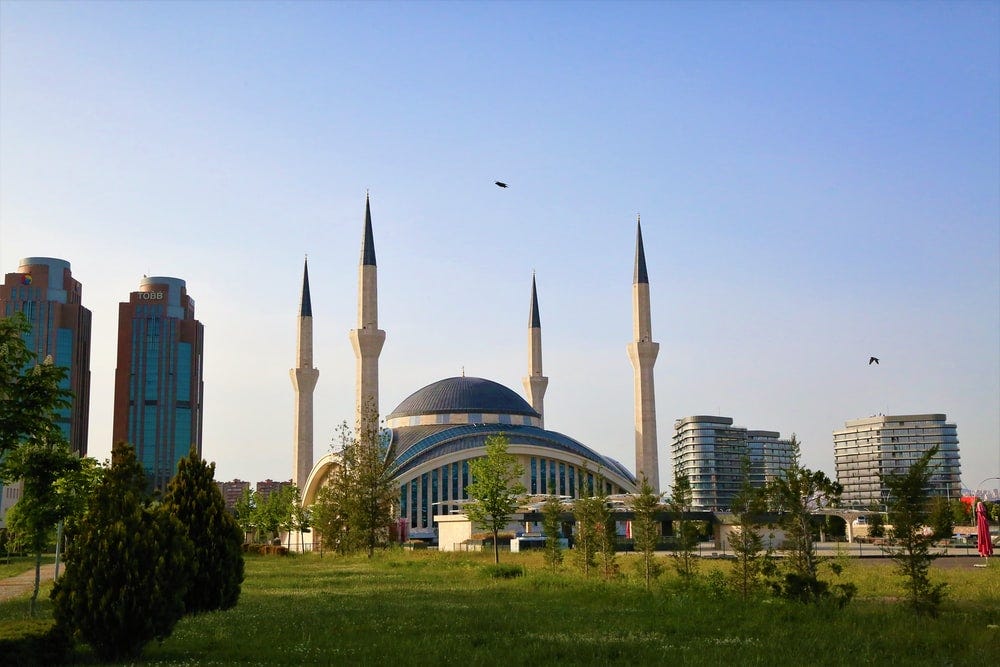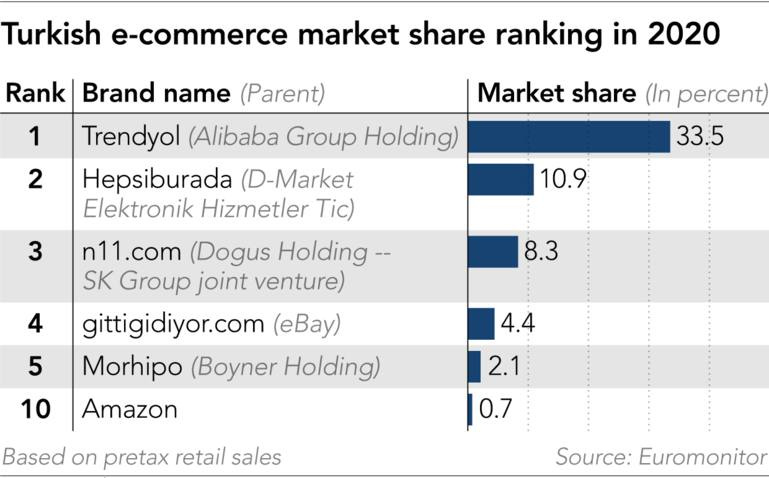Emerging Markets Daily - August 10
Turkey's First Decacorn, UN Chief: Climate Report 'Death Knell' for Fossil Fuels, EM Economic Damage, Belt and Road in Cambodia, KakaoBank Included in MSCI
The Top 5 Emerging Markets Stories from Global Media - August 10
SoftBank Investment in Trendyol Creates Turkey's First Decacorn
Nikkei Asia
“Turkey's largest e-commerce company, Trendyol, said on Monday it has agreed to raise $1.5 billion in fresh funding from global institutional investors, including the SoftBank Vision Fund 2 and General Atlantic, driving up the Alibaba Group unit's valuation to $16.5 billion.”
“In a statement Trendyol said that the funding makes the online marketplace operator Turkey's first decacorn -- an unlisted company valued at more than $10 billion.”
“The statement also said that the investment is the first in the country for Japan's SoftBank, an early investor in Alibaba that has also backed South Korean e-commerce leader Coupang…”
“The company has also pursued international expansion, starting overseas sales of fashion products in 27 European countries from October 2020.”
“Trendyol is not alone in seeing opportunities in Turkey. Hepsiburada, its top competitor, was valued at $3.9 billion in its July initial public offering -- the first listing by a Turkish company on the Nasdaq. Another major online marketplace player, n11.com -- a joint venture between a subsidiary of South Korea's SK Group and its Turkish partner Dogus Holding -- has applied to local authorities for an IPO in Turkey at the end of May.” Sinan Tavsan reports
UN Chief Says New Climate Report Should be “Death Knell” for Fossil Fuels
“The United Nations panel on climate change told the world on Monday that global warming was dangerously close to being out of control – and that humans were ‘unequivocally’ to blame.”
“Already, greenhouse gas levels in the atmosphere are high enough to guarantee climate disruption for decades if not centuries, the report from the scientists of the Intergovernmental Panel on Climate Change (IPCC) warned.”
“In other words, the deadly heat waves, gargantuan hurricanes and other weather extremes that are already happening will only become more severe. U.N. Secretary-General António Guterres described the report as a ‘code red for humanity.’”
“‘The alarm bells are deafening,’ he said in a statement. ‘This report must sound a death knell for coal and fossil fuels, before they destroy our planet.’ In three months’ time, the U.N. COP26 climate conference in Glasgow, Scotland, will try to wring much more ambitious climate action out of the nations of the world, and the money to go with it.” Financial Post reports.
Emerging Markets Could Face Permanent Economic Damage: BlackRock
“Some emerging markets face the risk of permanent economic damage from the coronavirus pandemic, the world’s largest asset manager BlackRock warned on Monday.”
“BlackRock’s Investment Institute economists said in a weekly note that whereas European growth was now catching up with the rate in the United States, emerging markets (EM) appeared to be limping towards stagnation.”
“They said it reflected challenges in many EMs where renewed COVID-19 outbreaks threaten lockdowns and more dire public health outcomes, while China’s potential economic slowdown could also have a widespread impact.”
“‘Over the long term, we see a greater risk of permanent damages in some EMs due to slow vaccinations and more limited policy space,’ said BlackRock, which recently downgraded its view on both EM equities and debt to ‘neutral.’”
“The Multilateral Leaders Task Force on COVID-19 Vaccines estimated at the end of last month that less than 20% of the vaccines needed to inoculate 40% of people in low and low-middle income countries was currently scheduled for delivery.” Reuters reports.
Belt and Road Dam in Cambodia Branded a ‘Disaster’ for Local Communities
Financial Times
“A Chinese-financed dam in Cambodia, part of Beijing’s Belt and Road Initiative, has been a human rights ‘disaster’ for indigenous and ethnic minority communities, according to a report published on Tuesday.”
“The plight of such people is being repeated in varying degrees across the vast Mekong river delta as the construction of scores of dams affects the fragile fishing and farming ecosystem upon which tens of millions of people rely, experts said.”
“‘More than 400 large dams built across the Mekong’s mainstream and tributaries are delivering a death of a thousand cuts to the mighty river’s fisheries since dams block migratory fish passage and are putting the region on the edge of a food crisis,’ said Brian Eyler, south-east Asia director with the Stimson Center think-tank and author of Last Days of the Mighty Mekong.” John Reed and James Kynge report
Buoyed by MSCI Inclusion, KakaoBank Extends Gains
The Korea Times
“Buoyed by an announcement to put KakaoBank on the MSCI Emerging Markets Index list later this month, the online bank operator extended its heavy gains on the country's bourse.”
“…Investors are betting heavily on the growth potential of KakaoBank's business expansion from mobile banking to retail. Plus, inclusion on the MSCI will be a major positive factor in terms of attracting more foreign ‘passive money,’ because the MSCI index is widely used as a barometer to gauge the finances of fast-growing companies in emerging economies. KakaoBank's inclusion in the index is expected on Aug. 20.”
“KakaoBank is the country's first digital bank to go public. It was the country's largest initial public offering (IPO) since 2017, when local game company Netmarble went public.” Kim Yoo-chul reports
What We’re Also Reading….
War-Ridden Somalia Starts Payments System as It Rebuilds Nation
Bloomberg
“Somalia has set up a national payments system as part of plans to develop the financial industry in one of the world’s most fragile states, following decades of political and economic instability.”
“The 13 lenders in the Horn of Africa nation can now ‘become inter-operable, connected to the clearing and settlement system of the central bank and able to transact with each other,’ Central Bank of Somalia Governor Abdirahman M. Abdullahi said in an interview. The system will ‘facilitate transactions between vendors and their customers more efficiently.’”
“Somalia is struggling to rebuild after 20 years of civil war and is still battling an insurgency by al Shabaab, an al-Qaeda affiliate.” Mohamed Sheikh Nor reports
Japan and Singapore Launch Alternative Energy Initiatives
Defense News
“Some Asian countries’ militaries are gearing up for a new energy paradigm amid a perfect storm of security concerns, climate change and the emergence of renewable resource options that are driving operational changes.”
“The economic powerhouses of East Asia, such as Japan and South Korea, have for a long time understood the vulnerability of their energy supply, and how it is vital to their economies, which primarily consist of oil products sent by sea from the Middle East through a number of maritime chokepoints.”
“…Japan on July 13 released a defense whitepaper that, for the first time, mentioned climate change. The document noted that climate change will directly impact militaries around the world by increasing the demand to deploy forces for rescue operations, as well as threatening the safety of equipment and bases.”
“…The Singaporean military is part of this effort and has undertaken a number of measures to reduce its dependence on fossil fuels and decrease carbon emissions. These range from gradually replacing the Defence Ministry’s 400 administrative vehicles with hybrid — and eventually electric — models.” Mike Yeo reports




